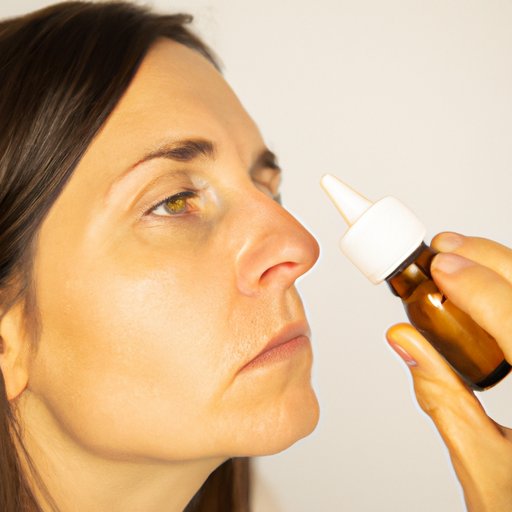
Introduction
Smell is one of the five senses that connects us to the world around us. It enables us to appreciate the aroma of our favorite food, the scent of spring flowers, or the waft of freshly brewed coffee. Unfortunately, many people experience a loss or reduction of their sense of smell, a condition known as anosmia or hyposmia. Causes can range from the common cold, nasal polyps, allergies, head injury, or even aging. The good news, however, is that there are several ways to improve your sense of smell, some of which we will explore in this article.
Lifestyle Changes
Making changes to our lifestyle is an essential part of improving our sense of smell. A healthy lifestyle ensures that our body is running at its optimal level, thus enhancing our sense of smell. Here are some tips to help you get started:
Adopt a healthy diet: Eating a balanced diet rich in fruits, vegetables, and whole grains can improve your overall health and your sense of smell. Foods that contain zinc, vitamin A, and omega-3-fatty acids can particularly support and enhance smell-sensing nerve cells.
Limit your exposure to toxins: A variety of chemicals, such as air pollutants, cleaning chemicals, and pesticides, can interfere with our sense of smell. Minimize your exposure to these toxins by, for example, using natural cleaning agents or buying organic food products.
Reduce consumption of alcohol and tobacco: Consumption of tobacco, whether smoking or the consumption of smokeless tobacco, damages the olfactory system. Overconsumption of alcohol also dulls our senses, including our sense of smell, and can lead to an irreversible loss of smell in some cases.
Breathing Exercises
Breathing exercises are an effective way of improving nasal function and enhancing our sense of smell. Here are some practices that can help.
Alternate nostril breathing: This exercise involves breathing through one nostril at a time and is believed to improve overall breathing, reduce stress, and improve the function of the olfactory system. Sitting in a comfortable position, use your right thumb to close your right nostril and inhale deeply through your left. Hold the breath for a moment, then release your thumb and use your right ring finger to close your left nostril while you exhale through the right. Inhale through your right nostril next, hold, and then release your left nostril while you exhale.
Humming: The vibrations produced by humming create positive pressure on our sinuses. Sitting comfortably, take a deep breath, and hum while exhaling.
Essential Oils
Essential oils are highly concentrated plant extracts known for their aromatic and therapeutic properties. They can help in restoring our sense of smell and have a calming effect on our nerves. Here are some essential oils that can be used:
Lemon: Lemon oil is known to aid memory recall and can also stimulate the limbic system, responsible for our sense of smell and emotional response.
Lavender: Lavender oil is known for its calming and soothing effects. It can also help with respiratory conditions, which can improve nasal function and hence enhance our sense of smell.
Peppermint: Peppermint oil has a refreshing and energizing effect and can help clear blocked sinuses, thus improving nasal function.
Nasal Sprays
There are many types of nasal sprays that can be used to restore our sense of smell. Nasal sprays, whether over-the-counter or prescribed by a doctor, can help to reduce inflammation in the nasal passages, clear blockages, and help new olfactory cells to grow. Here are some options:
Saline nasal sprays: Saline sprays can help hydrate the nasal passage, thus reducing inflammation and clearing blockages.
Steroid nasal sprays: Steroid nasal sprays are commonly prescribed by doctors to help reduce inflammation in the nasal passages. They are usually safe to use over the long term but should be used with caution and under the guidance of a healthcare professional.
Home Remedies
There are many simple and safe remedies you can try at home to improve your sense of smell. Here are a few examples:
Steam inhalation: Steam inhalation is a simple way to improve your sense of smell. Boil some water and transfer it to a bowl. Add a few drops of peppermint or eucalyptus oil, cover your head and the bowl with a towel, and inhale the steam for a few minutes.
Smell training: This involves inhaling essential oils with strong scents and identifying them by name. It can stimulate the olfactory system and can help to improve your sense of smell.
Medical Treatment
If your sense of smell does not improve despite the above measures, you may need to get medical treatment. Doctors may recommend medication to reduce inflammation or even surgical procedures to remove any blockages in the nasal passage. Some alternative therapies, such as acupuncture and hypnosis, may also be recommended. However, before trying any of these treatments, it is essential to consult your doctor first.
Conclusion
Regaining your sense of smell can be a gradual process that requires patience and effort. Making healthy lifestyle changes, trying breathing exercises, using essential oils and nasal sprays, trying home remedies, and consulting a doctor if necessary, can all contribute to restoring the sense of smell. However, if your sense of smell does not improve, be sure to consult your healthcare provider to determine the underlying cause. With a positive attitude and perseverance, you can regain your sense of smell, and appreciate the wonderful scents of the world around us.





